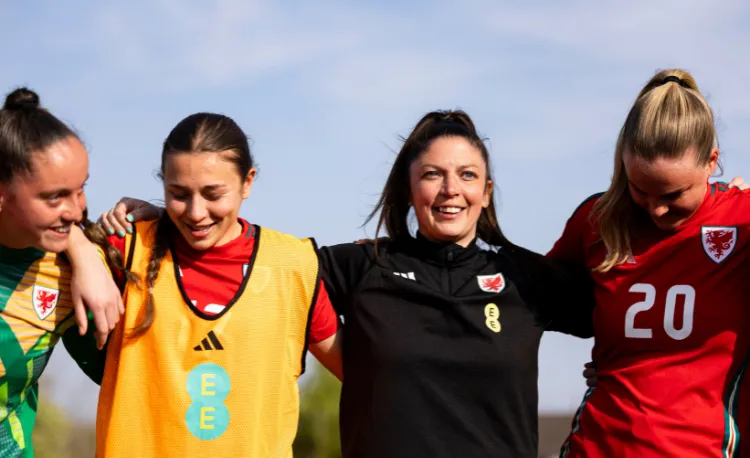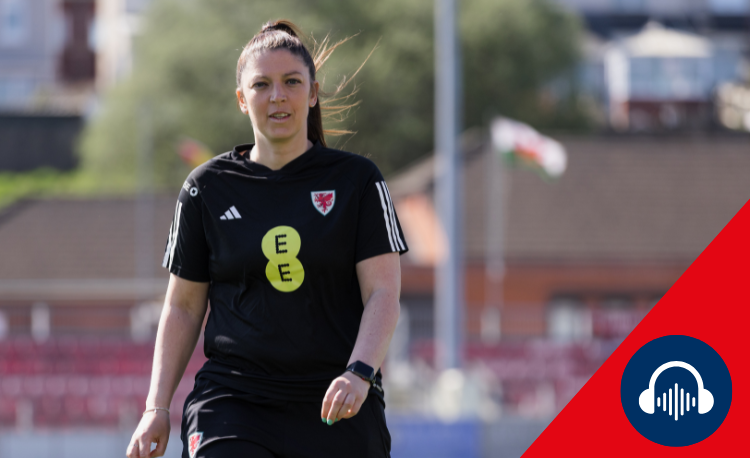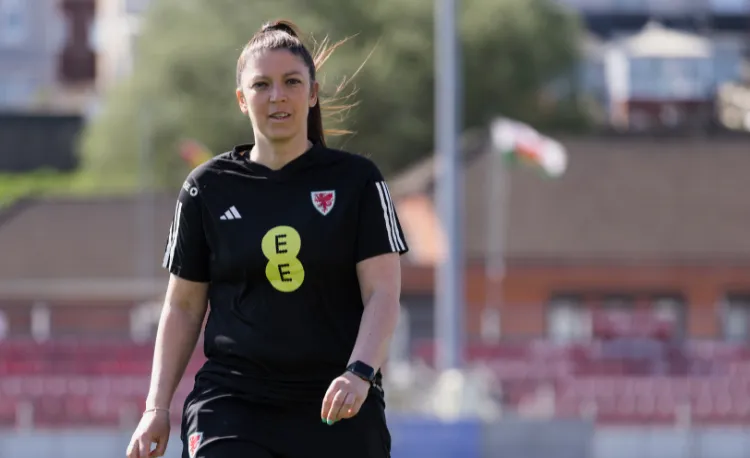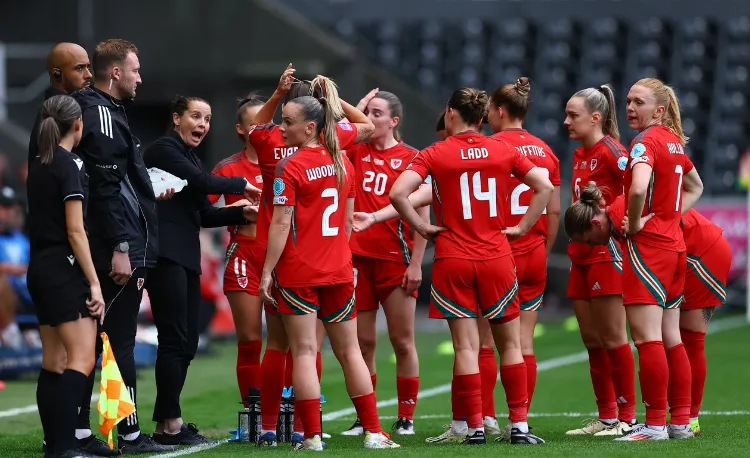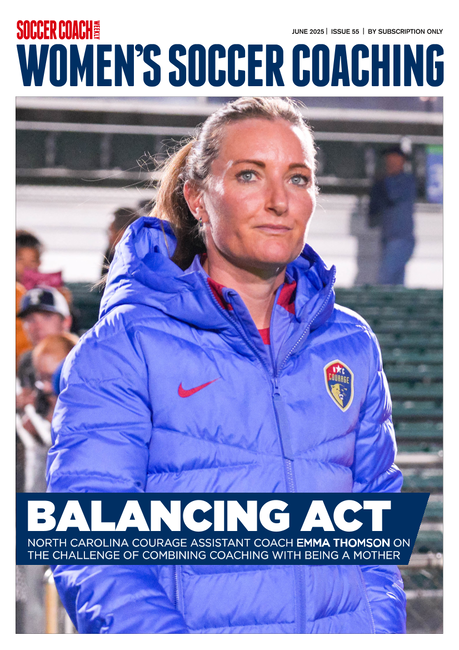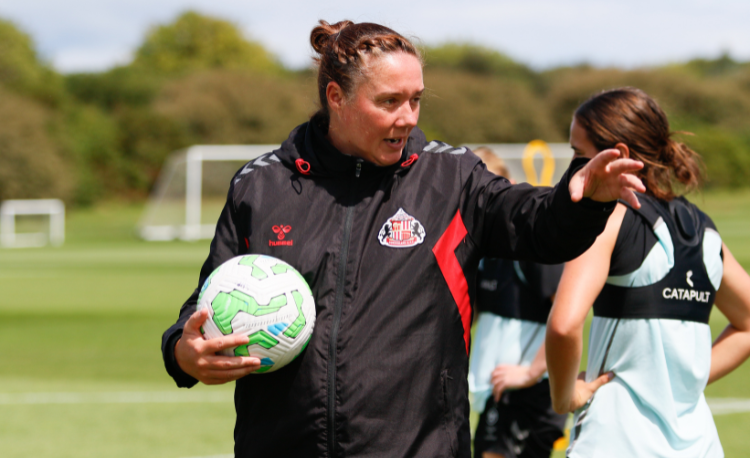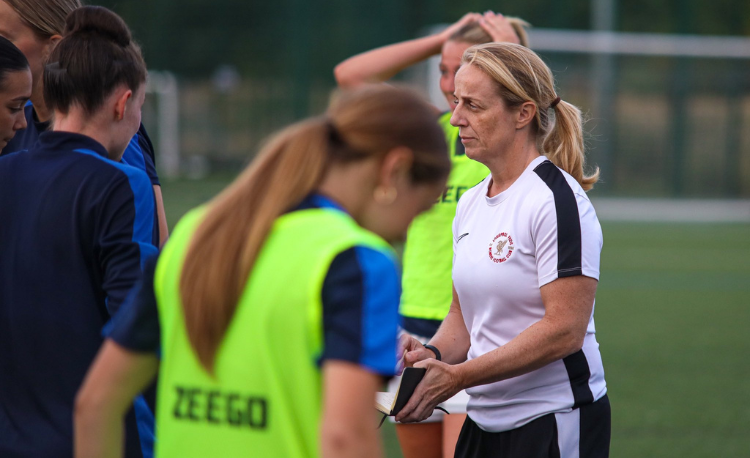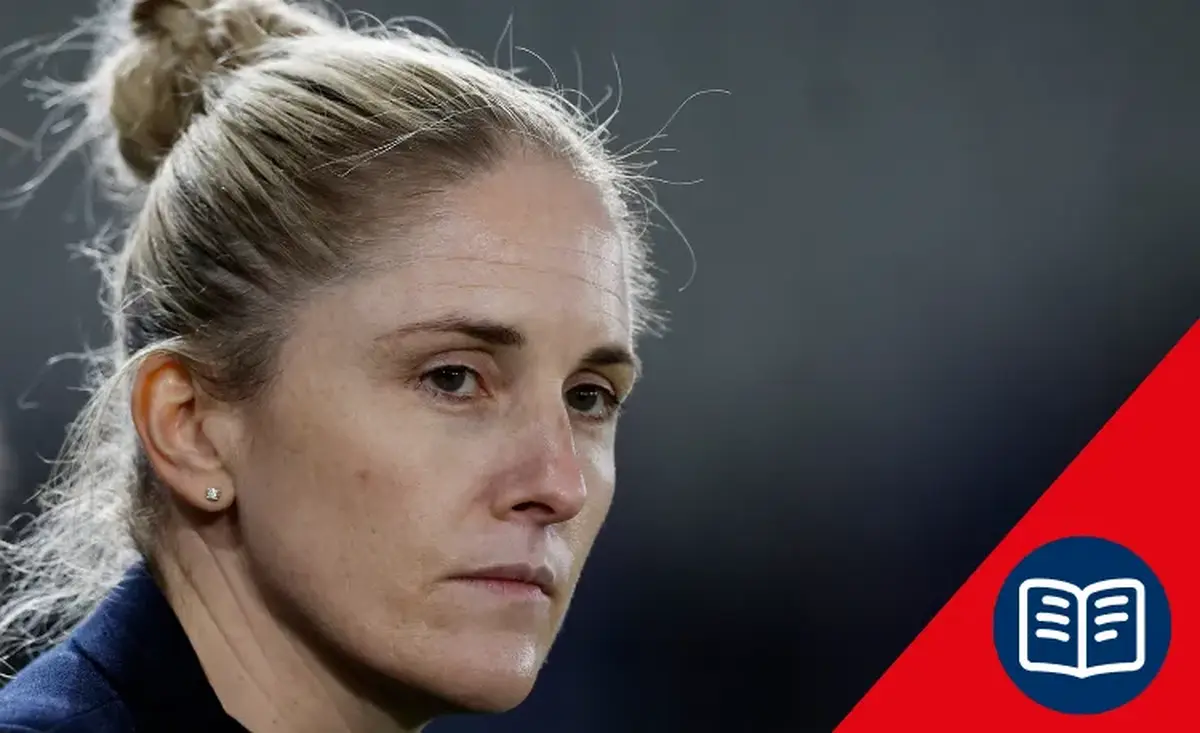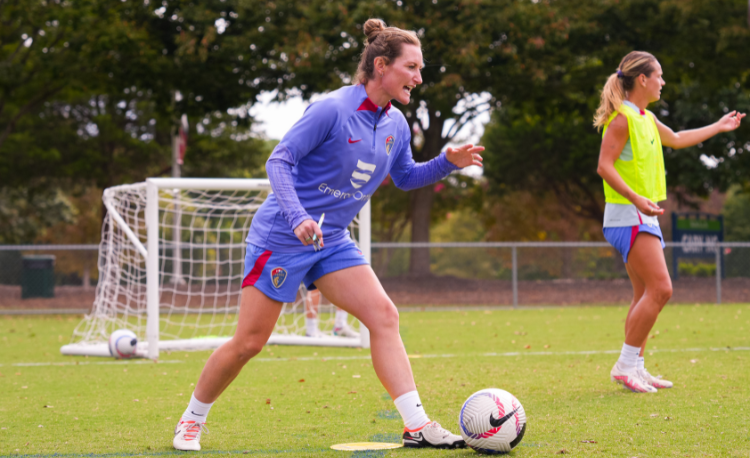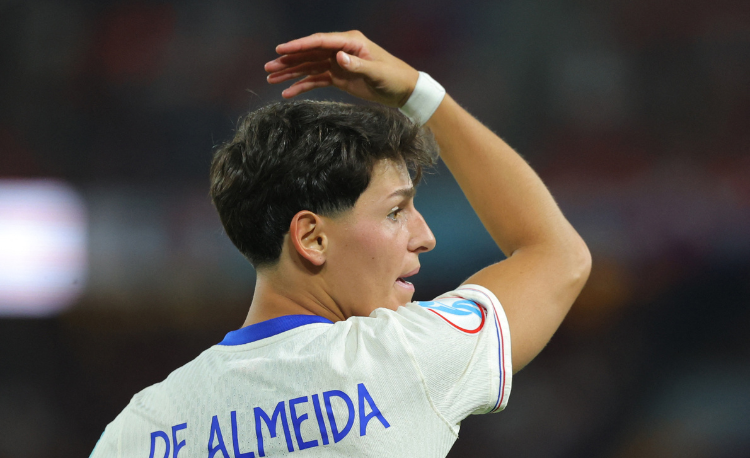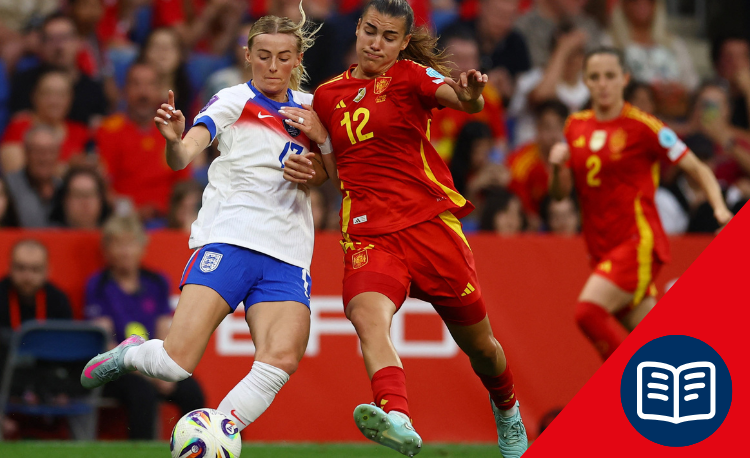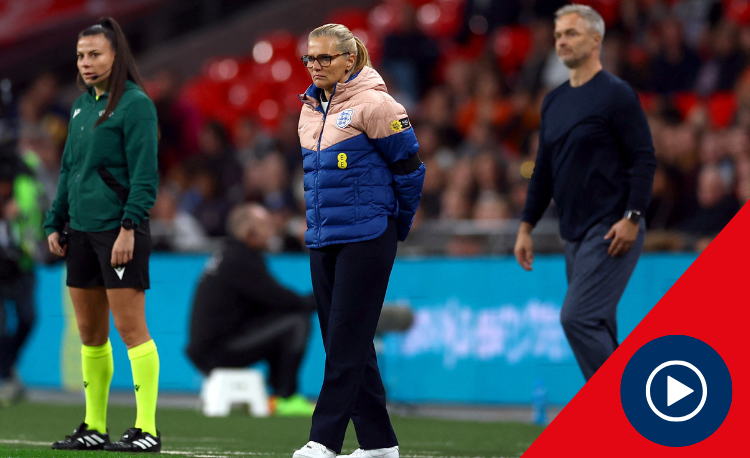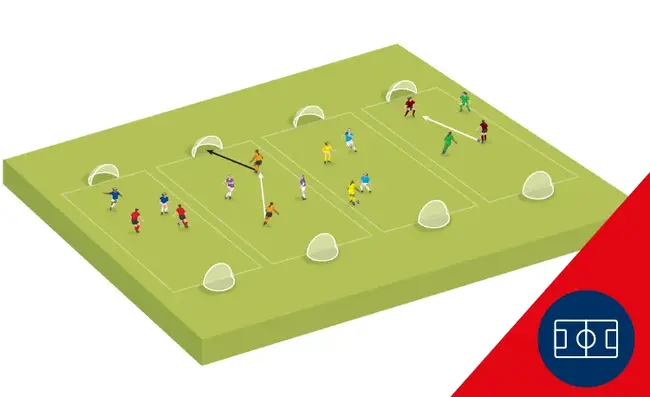You are viewing
2 of your 3 free articles
Nia Davies: ‘It's a landmark achievement’
Wales Women’s under-19s coach is at Euro 25 as part of the technical team for the senior side. She speaks to Carrie Dunn about her role in Switzerland and the impact of tournament qualification on the pathway in Wales
“To go to any major tournament for any country is a big achievement, especially in Europe where it’s so competitive, but to do it for the first time is a landmark.”
Wales Women’s under-19s coach Nia Davies is excited for the summer. Rhian Wilkinson’s senior team will compete in the Women’s Euros for the very first time, and the impact it will have extends beyond the matchdays.
“You saw it in previous competitions where winning it has a huge impact on the girls in that country, the fan base, and on youth players coming through.
“For the team itself, it’s what they’ve been working for, for so long. They’ve had disappointment in previous qualifications. It’s a massive thing for them.”
The Welsh technical team
This summer, Nia takes a role within the wider technical team, reporting on the opposition Wales are likely to face if they progress beyond the group stages. That will mean watching all three Germany games, and not just seeing what they do, but what the opposition do against them.
“You find solutions in in other teams. Coaches are thieves in the sense that you take a little bit of tactical knowledge from other coaches and other teams as well to benefit you.
“You have to keep up with the game. The game evolves, and as coaches, we have to evolve as well. On my coaching courses, I try and ask questions as much as possible, and even in coach education where I’m mentoring people, [I try to] instil that love for learning, You can learn in any environment and any situation.”
Nia’s role as a coach in the age-group national teams means that her work has had an impact on some of the players who have now progressed through to the senior squad. It makes watching Wales’s progress even more exciting and fulfilling for her – “if that was possible!” she smiles.
It also means that there is now an awareness and an acknowledgement that reaching these major tournaments is something within Wales’s grasp – and the young players coming through can repeat these feats.
“Now can we actually make that more consistent in the qualification for women’s [tournaments]? Can we do it a youth national level and being competitive in that tournament as well?
“It will take a little bit of time, but this is the [first] step in achieving some of those targets moving forward.”
The player pathway
In recent years, the Wales under-19s have a great track record of stepping up to the senior squad while still eligible for the age-group competitions. Take Carrie Jones, making her debut in 2019 before turning 16, or Mared Griffiths and Mayzee Davies, both receiving their first call-ups in 2024.
Supporting young players to make that leap up is part of Nia’s job, she says.
“We have missed a couple of the players that could have played in our 19s, eligibility-wise, for their year of birth. but that’s what is exciting. Yes, you want your best team at 19s, but if that’s an opportunity for a player to go to the senior environment - whether that’s as a training player, as we’ve had some of our players do already, but also some of them actually have got minutes and caps and starts for the senior team – it’s a massive bonus, and that’s what the youth teams are there for.
“Yes, you’d love to qualify for youth tournaments but ultimately we want to try and get as many of these players into that senior environment, whether that’s straight away or maybe it’s a couple of seasons down the line.”
Additionally, that visible progression helps to inspire the rest of the group.
“The growth you see in those players after having experienced that senior environment is massive,” she says. “It strengthens everything in our pathway. It’s been huge for us, and it’s great for me as a coach to be able to push the players a little bit further because they can see that it is available if they do that hard work.”
Nia describes the relationship between all the head coaches throughout the Wales pathway as “open and honest”, with plenty of conversations about players and the best way for them to progress, and this way of working is led by Wilkinson, who took over as the senior team’s head coach in February 2024.
“It’s absolutely brilliant to work with Rhian. It’s so refreshing to have a head coach of a senior team to be so open to give youth an opportunity.
“Those discussions go on all the time: the depth chart, who’s doing well, what’s our priority, players to really push for the seniors. My voice to Rhian is giving her insight into what we’ve got in the 19s because the [international] windows [for Under-19s and senior teams] clash, so it’s very hard when the senior team manager can’t really watch in person and vice versa.
“That communication between both parties is so important because otherwise you would probably lose a couple of opportunities to really push certain players in the 19s to the seniors.”
Nia’s journey into coaching
Nia’s passion for coaching has been evident since her university years, when she graduated with a degree in sports science but knew that it wasn’t what she wanted to pursue directly. She got the chance to coach part-time in the Swansea City academy while she was studying, and that helped her decide on her future career path.
“There were loads of resources. You were working every day, coaching every day, and that’s where I found that passion. I was doing the foundation phase - the younger ones, under 9s and the 10s boys - but that’s where I realised that’s what I wanted to do. It developed from there.
“Season by season, it’s progressed. That’s where I found my love for coaching: seeing players develop. There’s nothing better than seeing that and that’s why I think the youth is so important. You see that development quite quickly, and if you’ve helped in a small part of that it’s so rewarding.”
After that, she stepped into the academy manager role, and then moved into the FAW, first covering maternity leave, then as assistant coach at age-group level, and now as head coach. Something she thinks is crucial in her own coaching journey, though, is that her own first childhood coach was female.
“I think that’s benefited me going into coaching courses with all men. I don’t see it any different. I’m not inferior [in] those sort of environments. So she was a massive part of where I’ve got to now by just that normalisation of being a female coaching football.”
Nia also mentions as inspirations Nicola Anderson, her predecessor as Wales Under-19s coach, former Scotland coach Anna Signeul, and former Austria coach Irene Fuhrmann, who has been paired with her via the UEFA Coach Mentor programme. Fuhrmann has recently joined Nia on camp, and her experience and perspective have proved very useful.
“You overthink things as a head coach. ‘Did I do that thing right? Could I have done that better?’ But sometimes when she says, ‘The way that you structured that meeting or session was really good and the players learned,’ that gives you that confidence to continue.
“She’s a great human being, but also a great professional coach that can help me in different situations. I’m going to try and take as much as I can out of it.”
The women’s game in Wales
Mia hopes to be able to take her learning from the mentoring and her work over the summer back to her under-19s squad and use it to develop her players. Wales may always be faced with the challenge of their nearest neighbour hosting one of the biggest and best domestic leagues in the world.
However, knowing that not all academy players will progress into the professional game, Nia says that it gives Wales an opportunity to prepare and support them into the semi-professional Adran Premier, and then go on to improve the standard of competition there.
“That will grow the leagues, grow the clubs,” she says. “That will definitely help with the number of players that are coming from this sort of legacy of going to the Euros.”
Within the international set-up, she hopes that one day there will be an under-21s or an under-23s squad for young Welsh women to progress into.
“You work with the 19s and you see the potential. If they’re not quite ready, where do they go?”
Many are, of course, ready, and Nia hopes to see more of her squad move through to the senior squad.
“Realistically, it’s not going to be every single player, but giving them the opportunity is the best part: seeing the youngsters get an opportunity in the senior environment and hopefully seeing them go into major tournaments further down the line as well.”
The importance of networking
Nia recommends that anyone wanting to carve out a career in football in any capacity looks to develop their network as widely as possible – even if that feels challenging at first.
“I was quite shy to start with, but I realised once you network with people it’s a massive help.
“I’ve seen, in the last probably three years, that networking is so special and it’s something I’d advise anyone to try and do as much as they can in their career. As a coach or as a sports scientist or whatever, I think it’s really important that you connect with people, not just in your environment, but outside as well, because you will probably learn a lot more. It’s like a fresh pair of eyes on it, it’s not tunnel vision. They’ll tell you different things that they’ve experienced and you can try and implement into your environment.”
A small nation – player opportunities in Wales
Wales has a population of around 3.2 million, meaning the talent pool for elite sports is necessarily small. With no professional domestic league, top young players often choose to cross the border into England, or go further afield – perhaps to the US and pursue collegiate football. It means creative thinking and a lot of travel for elite youth coaches like Nia.
“We have to be realistic in the sense that probably not all of our players will be in Wales all the time,” she says.
“We understand that we have to look in English clubs if they’ve got Welsh eligibility or if players are moving to university you’ve got to go to different clubs all the time. Last year I was up in the north-east of England, then I was in the south, for example, to watch players.
“We have to be clever in the sense that hopefully we make relationships with clubs [so they] know that there’s opportunities for some players that maybe don’t get to [represent] the bigger nations - but if they’ve got eligibility, there’s an opportunity for them to experience international football with us.”
Newsletter Sign Up
Newsletter Sign Up
Discover the simple way to become a more effective, more successful soccer coach
In a recent survey 89% of subscribers said Women's Soccer Coaching makes them more confident, 91% said Women's Soccer Coaching makes them a more effective coach and 93% said Women's Soccer Coaching makes them more inspired.
*includes 3 coaching manuals
Get Inspired
All the latest techniques and approaches
Women's Soccer Coaching offers proven and easy to use soccer drills, coaching sessions, practice plans, small-sided games, warm-ups, training tips and advice.
We've been at the cutting edge of soccer coaching since we launched Soccer Coach Weekly in 2007, creating resources for the grassroots youth coach, following best practice from around the world and insights from the professional game.
